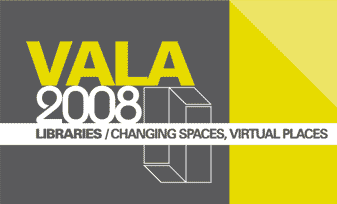 Repositories through the looking glass
Repositories through the looking glass
VALA 2008 PLENARY 1: Andy Powell
Tuesday 5 February 2008, 09:00 – 10:15
Persistent URL: http://www.vala.org.au/vala2008-proceedings/vala2008-plenary-1-powell
 Andy Powell
Andy Powell
Head of Development, Eduserv Foundation, UK
http://www.eduserv.org.uk/research
 Please tag your comments, tweets, and blob posts about this plenary presentation: #VALA2008
Please tag your comments, tweets, and blob posts about this plenary presentation: #VALA2008
View Paper [Not available]
Abstract
“I can’t remember things before they happen.” “It’s a poor sort of memory that only works backwards,” the Queen remarked.
Repositories of open access scholarly papers are a well-established part of the information landscape, at least in policy terms, and their successful delivery will almost certainly feature somewhere on the agenda of most academic libraries. Repositories are of interest not just in their own right but as a microcosm of the wider library landscape – indicating how the world is changing and how libraries need to change in response. Drawing on a range of perspectives from political and social to technical, this presentation will attempt to answer the question: what do Web 2.0 and the Semantic Web tell us about the future of repositories and, by implication, about library services generally?

 The VALA2008 14th Biennial Conference and Exhibition was held at the Melbourne Convention Centre, Melbourne, Australia from 5 – 7 February 2008. The theme for this conference was “LIBRARIES / CHANGING SPACES, VIRTUAL PLACES”.
The VALA2008 14th Biennial Conference and Exhibition was held at the Melbourne Convention Centre, Melbourne, Australia from 5 – 7 February 2008. The theme for this conference was “LIBRARIES / CHANGING SPACES, VIRTUAL PLACES”.
 Repositories through the looking glass
Repositories through the looking glass